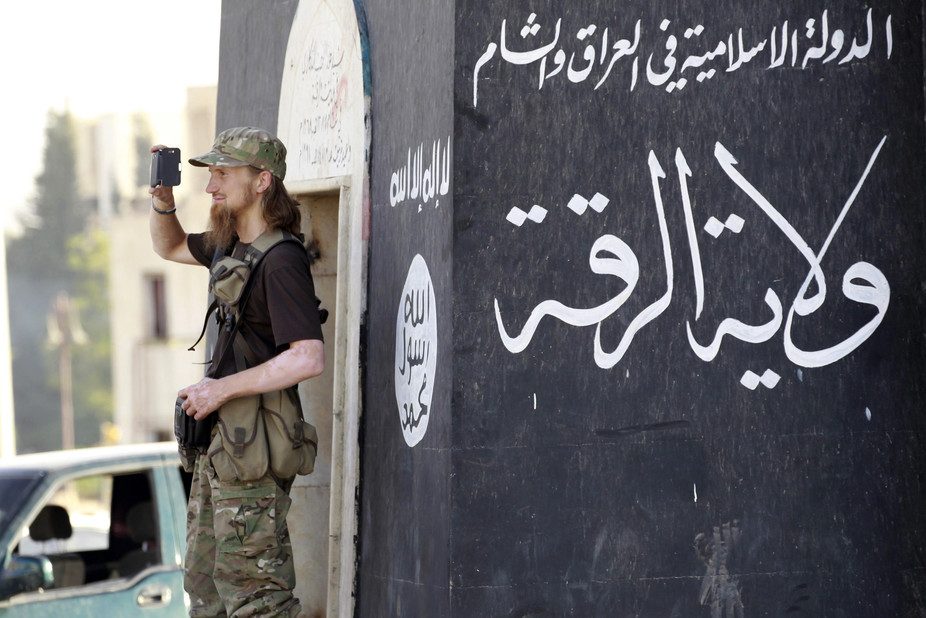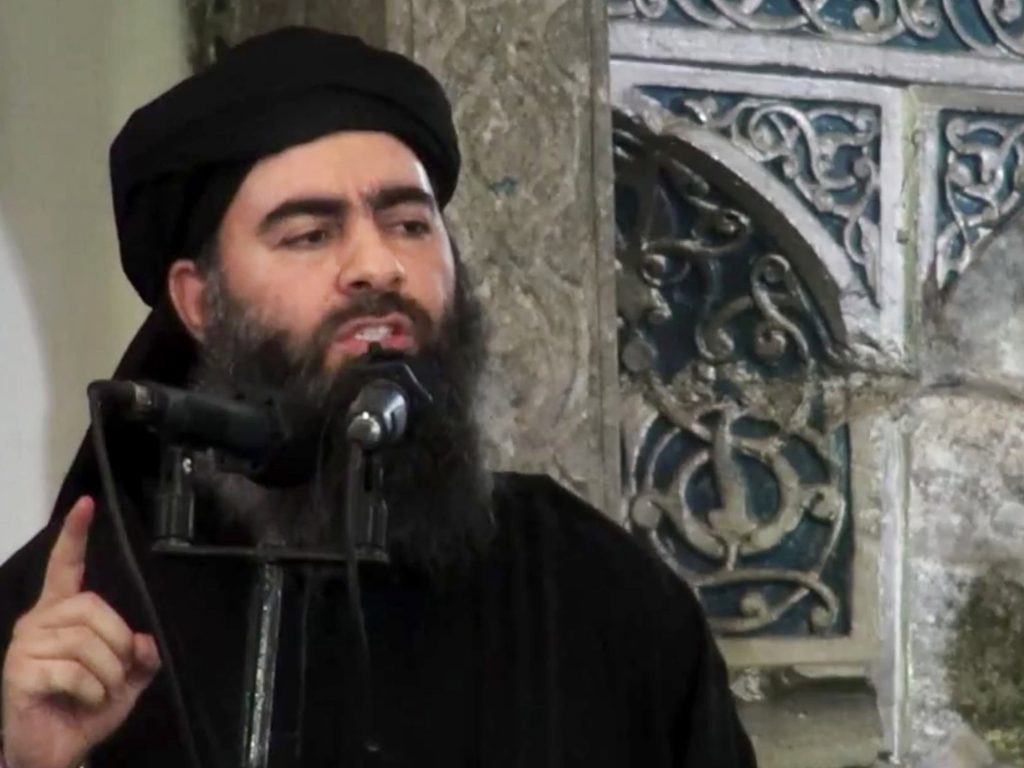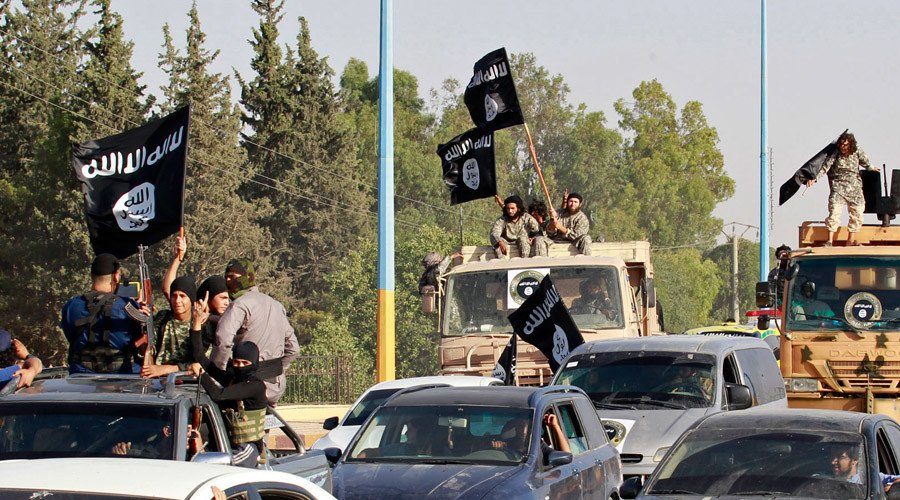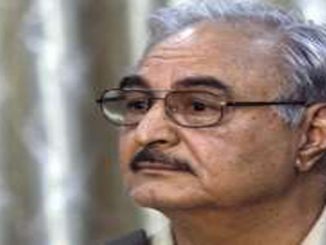
On July 4, 2014, a black-turbaned cleric named Abu Bakr al-Baghdadi took to the pulpit of the Grand Mosque in the Iraqi city of Mosul and proclaimed the founding of a new caliphate.
Already in control of eastern Syria and western Iraq, this so-called Islamic State had global ambitions, Mr. Baghdadi declared. The self-appointed caliph vowed to restore “dignity, might, rights and leadership” to his fellow Sunni Muslims everywhere.
That audacious sermon from the heart of Iraq’s second-largest city was the culmination of a jihadist blitzkrieg that had seized most of the Sunni Arab parts of Iraq in previous weeks. It was also, it turned out, the high point of Islamic State’s bid to conquer the world.
Islamic State now seems likely to fall as swiftly as it rose. In the past two years, the group has gone to war with everyone from al Qaeda to Iran’s Shiite theocracy to the U.S. and Russia. It has launched attacks in the West and elsewhere—or, at any rate, claimed credit for them—with rising frequency, even as it has suffered a series of battlefield defeats and surrendered one city after another.
It is easy to think that Islamic State is still on the march. It isn’t. Over the past year, the territory under its control—once roughly the size of the U.K.—has shrunk rapidly in both Iraq and Syria. Islamic State has lost the Iraqi cities of Ramadi and Fallujah, the ancient Syrian city of Palmyra and the northern Syrian countryside bordering on Turkey. Its militants in Libya were ousted in recent weeks from their headquarters in Sirte. In coming months, the group will face a battle that it is unlikely to win for its two most important remaining centers—Mosul in Iraq and Raqqa in Syria.

What happens once Islamic State falls
It may be tempting fate to ask the question, but it must be asked all the same: What happens once Islamic State falls? The future of the Middle East may well depend on who fills the void that it leaves behind both on the ground and, perhaps more important, in the imagination of jihadists around the world.
As we mark the 15th anniversary this weekend of the terrorist attacks of 9/11, one likely consequence of the demise of ISIS (as Islamic State in Iraq and Syria is often known) will be to revive its ideological rival, al Qaeda, which opposed Mr. Baghdadi’s ambitions from the start. Al Qaeda may yet unleash a fresh wave of terrorist attacks in the West and elsewhere—as may the remnants of Islamic State, eager to show that they still matter.
“Simply having ISIS go away doesn’t mean that the jihadist problem goes away,” said Daniel Benjamin of Dartmouth College, who served as the State Department’s counterterrorism coordinator during the Obama administration. “Eliminating the caliphate will be an achievement—but more likely, it will be just the end of the beginning rather than the beginning of the end.”
What made Islamic State unique—and, until recently, so appealing to many young, disaffected Muslims—is that it managed to create an actual state in Syria and Iraq. In Mosul last year, food prices were lower than in Baghdad and the streets were kept clean, even as the group drove out the city’s Christians and Shiites, banned women’s beauty salons, forbade men from shaving their beards and threw gay men from rooftops. Unlike Taliban-ruled Afghanistan in the 1990s, it was also a place in the heart of the Middle East to which adepts from around the world could migrate relatively easily, by way of Turkey’s porous borders.

Wide Islamic refusal
When Mr. Baghdadi proclaimed his caliphate, demanding that all Muslims world-wide pledge allegiance to him and, if possible, relocate to the new state, more established jihadist leaders and clerics decried the move as illegitimate. They dismissed the new “caliph” as unqualified and warned that the whole venture would inevitably collapse, imperiling the jihadist cause.
Al Qaeda’s leader, Ayman al-Zawahiri, was one of the most virulent of these critics. He branded Islamic State as the new “Kharijites”—a universally reviled splinter sect of early Islam known for killing indiscriminately and falsely labeling other Muslims as infidels.
But as long as Islamic State kept going from strength to strength, such criticism didn’t seem to matter. Victories on the battlefields of Syria, Iraq and Libya were seen by Islamic State—and its potential backers and recruits—as divine validation of its project. Al Qaeda affiliates as far away as the Philippines and the North Caucasus switched their allegiance to Mr. Baghdadi.
By the same token, however, battlefield losses today are undermining Islamic State’s theological foundations. “The loss of territory will pose a major problem because a great part of Islamic State’s legitimacy since the establishment of the caliphate in 2014 has arisen from control of territory,” said Stéphane Lacroix, a specialist in Islamist movements at Sciences Po University in Paris. The group has argued “that the caliph is legitimate precisely because he controls territory,” he added.
Today Mr. Baghdadi controls less and less of it, with Islamic State abandoning the Syrian town of Jarablus and scores of nearby villages without much of a fight in recent weeks. “We are at a point here where we are now really into the heart of the caliphate,” said Gen. Joseph Votel, the commander of U.S. Central Command, on Aug. 30. “We do see momentum building in Iraq and Syria.”
Are these defeats the end of the state?
Islamic State itself has acknowledged that not much may be left of the caliphate soon. The group’s chief spokesman, Abu Muhammad al-Adnani, tried to prepare its followers in a speech released in May. “Will we be defeated and you victorious if you took Mosul or Sirte or Raqqa or all the cities and if we returned as we were in the beginning?” he asked the organization’s enemies. “No, defeat is losing the will and the desire to fight.” (Adnani was killed in an airstrike in Syria in late August.)
Islamic State won’t vanish completely, as an ideology or a terrorist organization, even if it loses all its lands. Its precursor in Iraq survived the U.S. troop surge in 2007-09, bouncing back as the sectarian policies of the Shiite-led Iraqi government and the uprising against Syrian President Bashar al-Assad provided new opportunities for recruitment and expansion. And Islamic State is almost certain to try to demonstrate its relevance by staging more headline-grabbing massacres in the region and the West. The death rattle, counterterrorism experts warn, could be ferocious.
“As the physical caliphate disintegrates, and as it comes apart, as we dismantle it, I think that they will return to more of their terrorist-like roots. And so they will continue to try to either direct or support or potentially inspire attacks outside of the core in Iraq and Syria,” said Gen. Votel.
Still, the transformation of a de facto state into just another terrorist organization, one increasingly concerned with its own survival and discredited even among many fellow jihadists, is bound to shake the Middle East anew. Millions of people chafing under Islamic State rule will sigh with relief, as will the millions more ousted from their homes. But dismantling the “caliphate” won’t end the conflict now raging in and around Syria and Iraq—and may even intensify it.
Deep intra-Islamic tension
Over the past two years, the campaign against Islamic State has brought together an unusually broad coalition that included Western democracies, Russia, Iran, Shiite militias, Turkey, Kurdish militias and Sunni Gulf monarchies. As Islamic State dwindles, some of these unlikely partners will probably turn on each other as they fight for the caliphate’s spoils.
Already, Turkey (a U.S. ally and fellow NATO member) and U.S.-backed Kurdish forces have clashed in northern Syria over lands recently wrested from Islamic State. Iraq’s Shiite-dominated government is also increasingly squabbling with the leaders of the country’s autonomous Kurdish region, with Baghdad refusing to recognize Kurdish control over several areas liberated from Islamic State by Kurdish fighters.
“The setbacks that ISIS is facing are creating more problems than its existence ever did,” said Hassan Abu Haniyeh, a Jordanian researcher of jihadist groups. “The pretext of fighting ISIS delayed the conflicts and the protest movements across the Middle East. Eliminating ISIS will bring back the conflicts everywhere. And it will embolden the people who had been holding back on demanding reforms by their countries’ regimes because they were concerned about ISIS.”
Moreover, the sectarian strife between Sunnis and Shiites over dominance of the region—the rivalry that helped to foster Islamic State’s initial rise in Iraq and then Syria—isn’t going away. That rift would only be deepened if more of the caliphate’s territory, largely inhabited by Sunni Arabs, fell into the hands of the pro-Iranian Shiite militias that have done much of the fighting against Islamic State, particularly in Iraq. A Shiite-controlled corridor from Iran to Lebanon would be a strategic nightmare for Saudi Arabia and its Sunni allies—which will try to ensure that Sunni Arabs freed from Islamic State control can still fend for themselves, one way or another.
“There will not be a military solution unless there is also a political solution for all the problems in the Sunni areas, problems that have been there since the occupation of Iraq,” said Saleh al-Mutlaq, a leading Sunni Iraqi politician and the country’s former deputy prime minister.
All of this could be exploited by Islamic State’s main ideological rival in the jihadist universe, Mr. Zawahiri’s al Qaeda, which claims to stand for Sunnis combating what it alleges is a “Safavid-Crusader alliance” between the U.S. and Iran. (The Safavid dynasty converted what is now Iran from Sunni Islam to Shiism in the 16th century.)
Mr. Zawahiri has long been a vocal critic—first privately and then publicly—of Islamic State. The group grew out of the Iraqi franchise of al Qaeda shortly after its founder, the Jordanian terrorist Abu Musab al-Zarqawi, was killed by a U.S. airstrike in 2006. Mr. Zawahiri quarreled with Mr. Zarqawi, and even more so with his successors, over Islamic State’s strategy of wantonly killing Shiite civilians and refusing to seek popular support.
Beaten back by the U.S. troop surge and pro-government Sunni militias in Iraq, Islamic State roared to life again after Syria plunged into civil strife in 2011. The resulting vacuum gave the group a haven in which to capitalize on Sunni grievances, attract international volunteers and become the world’s most prominent jihadist organization. In February 2014, after months of increasingly bitter disagreements, Islamic State openly broke with al Qaeda—a split that also severed Mr. Baghdadi’s relationship with al Qaeda’s Syrian offshoot, the Nusra Front, which remained loyal to Mr. Zawahiri.
Al-Qaeda’s disapperance
Al Qaeda has been eclipsed by Islamic State’s gory attacks and gruesome videos, but it has not been idle. Under the leadership of Mr. Zawahiri, an Egyptian doctor now widely thought to be based in Pakistan, the organization has embraced a more pragmatic approach: decentralizing its operations, burrowing deep into its host countries and creating alliances with less radical groups.
“Zawahiri must be luxuriating. He steered al Qaeda in a much more nuanced and subtle approach and has always played the long game—and what he sees now is a validation of his strategy,” said Bruce Hoffman, the director of the Center for Security Studies at Georgetown University, who has advised the U.S. government on counterterrorism issues. With Islamic State “consuming all the oxygen in the room” for Western counterterrorism officials, Prof. Hoffman added, “nobody is paying much attention to al Qaeda.”
In recent weeks, Mr. Zawahiri has intensified his condemnations of Islamic State—which he sneeringly calls “the Ibrahim al-Badri group,” after Mr. Baghdadi’s real name—describing the rival organization as “a dagger in the back” of real Sunni jihadists. In a speech released online, Mr. Zawahiri contrasted Islamic State’s “abyss of extremism, infidel-branding and shedding forbidden blood” with al Qaeda’s efforts to bring Sunnis together.
Al Qaeda’s new emphasis on working as part of a broader alliance has been particularly striking in Syria. The Nusra Front has denied any interest in attacks outside Syria and, in July, said that it had cut ties with al Qaeda’s core—a move that Western officials dismissed as a ruse but that made the front more acceptable to other Sunni groups. The rebranded Nusra Front now operates as part of a rebel coalition known as the Army of Conquest, which includes both jihadists and more moderate, U.S.-backed militias. Many of these Syrian Sunnis cheer on the Nusra Front’s fighters for battling the Iranian-backed Assad regime, particularly in the northern city of Aleppo, and fume at U.S. efforts to target the group.
“I’m very impressed by how much [al Qaeda’s leaders] have learned from their mistakes and their bad experiences in Iraq,” said Robert Ford, who was the U.S. ambassador to Syria in 2011-14 and is now a senior fellow at the Middle East Institute. “They are much less brutal in Syria than they were in Iraq, and they work with non-jihadi factions, which al Qaeda in Iraq never did. They are more subtle in their tactics, and they have a lot more local support…This will make them much harder to contain: It’s going to be a much harder job to develop forces to fight them, and it’s going to be a much harder job to develop public support for that.”
Al Qaeda’s other large franchises—in Yemen and North Africa—could also take advantage of Islamic State’s fall. Al Qaeda in the Arabian Peninsula, which claimed credit for last year’s massacre in Paris of journalists at Charlie Hebdo magazine, has “a chance to flourish now” by focusing on backing its fellow Sunnis in the increasingly bitter and sectarian civil war in Yemen, notes Farea al-Muslimi, a Yemen expert at the Carnegie Middle East Center in Beirut. And as Islamic State fades, al Qaeda in the Islamic Maghreb—which has launcheddeadly assaults over the past year on international hotels in Mali, Burkina Faso and Ivory Coast—could forge closer ties with Mr. Baghdadi’s erstwhile subordinates in Nigeria’s ruthless Boko Haram insurgency, which is now riven by a leadership split.
“I don’t think everybody should relax after we get ISIS out of Mosul and Raqqa. The pressure must continue: If we relax, they will come back,” said Mahmoud Irdaisat, a Jordanian analyst and retired major general. “And we should not forget al Qaeda, because al Qaeda was the cradle from which ISIS came.”




